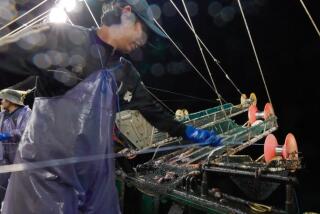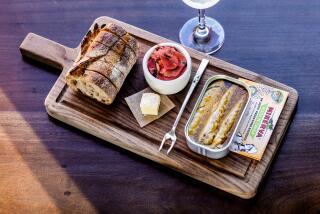McDonald’s fast-food fish gets Eco-label as sustainable
- Share via
Can we eat our way to sustainability?
That’s a question that Daniel Pauly, a preeminent fisheries scientist at the University of British Columbia in Canada, has asked for years. He’s suspicious of the long-term viability of the strategy behind Eco-labels, which promise that if everyone ate sustainably caught seafood, it would solve the problem of declining global fish stocks.
A grand experiment to test this notion is underway, as one of the world’s largest fish buyers has agreed to source all of its fish from America’s largest sustainable-caught fishery: wild-caught Alaskan pollock.
McDonald’s has signed up with the Marine Stewardship Council to verify all of its fish that gets breaded, fried and sold as “Filet-O-Fish” sandwiches are sustainably certified Alaskan pollock. In exchange for audits of its massive supply chain, McDonald’s each year can sell hundreds of millions of fish sandwiches, and soon-to-be sold Fish McBites, in boxes with the council’s trademarked blue Eco-label.
“It’s exciting for us,” said Susan Forsell, McDonald’s vice president of sustainability for the U.S market. Not only does this certify all its fish sandwiches are from one of the best-managed U.S. fisheries, it’s a chance for McDonald’s 790,000 U.S.-based employees to talk about the fast-food chain’s efforts to source its products in a sustainable way, she said.
That will bring a huge boost in visibility to the Marine Stewardship Council, which suffered near invisibility for years, as its scientific teams slowly certified various fisheries as healthy and sustainably managed. Now that the council has given its stamp of approval to the pollock fishery and other large ones, its success has raised question by some scientists. Will such a market-based approach be self-defeating in a world where most of the commercial stocks are already being fish at or beyond sustainable levels -- resulting in declining stocks?
Inevitably, Pauly suspects, such programs will create more customers for fish that are caught at levels low enough to be sustainable, increasing pressure to catch more of them.
McDonald’s got involved in the sustainable seafood movement after collapsing fisheries prompted the fast-food giant to look for long-term supplies for its 34,000 restaurants that serve 69 million customers each day in 119 countries.
Its whale-of-an-appetite for fish can cause a huge splash in any particular fishery. In the past, McDonald’s leaders said they watched various fisheries dry up, disrupting supply lines.
Now, the 14,000 McDonald’s restaurants in the United States will join its 7,000 in Europe selling fish with the Marine Stewardship Council label. In the United States, that means sourcing its fish from Alaskan pollock, North America’s biggest remaining fishery since the collapse of the New England and Canadian cod fishery.
ken.weiss@latimes.com






